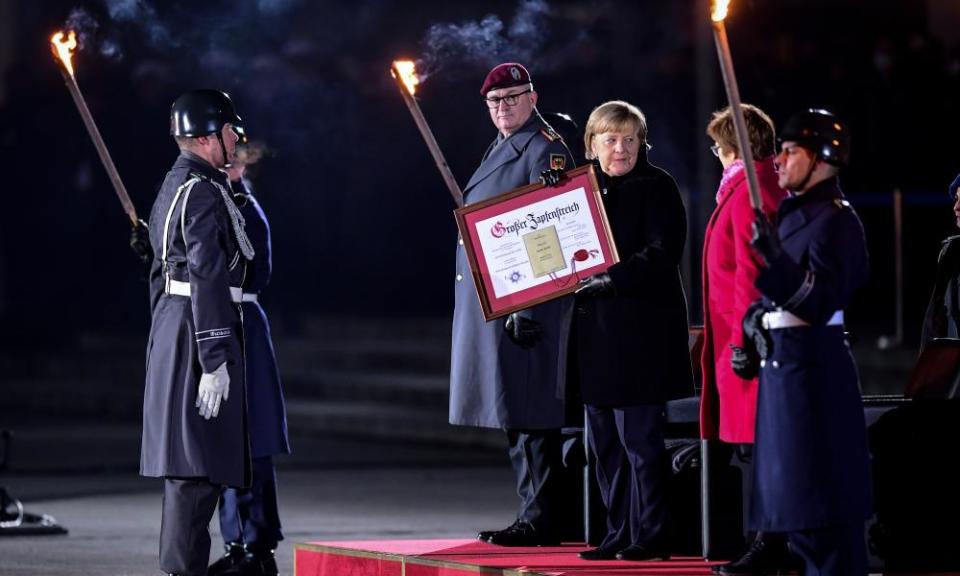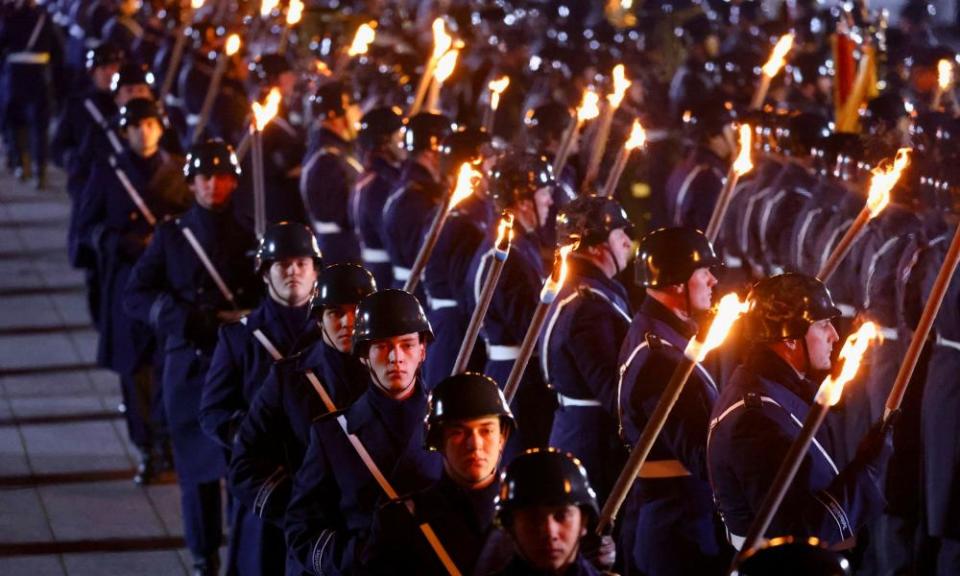Angela Merkel bows out to the sound of Beethoven and an East German pop hit

The end of Angela Merkel’s reign as German chancellor was marked with Beethoven, a romantic chanson and an East German pop hit, all played with clockwork precision by the Bundeswehr military band.
After 16 years in office, Angela Merkel is handing over to Olaf Scholz next week, and was awarded a military tattoo in her honour, the highest tribute to a civilian. Dressed in a simple black coat and black gloves, Europe’s most powerful politician looked sombre, betraying little emotion, as she watched torch-carrying soldiers in full regalia parade through the courtyard of Berlin’s defence ministry.
Hours before the ceremony, Merkel had announced tougher measures to curb Germany’s soaring coronavirus cases, including what her successor called “a lockdown of the unvaccinated”.
At the event she said her four terms were “eventful and often very challenging years.
“They have challenged me politically and humanly and, at the same time, they were also fulfilling.”
The event began with a Beethoven military march and ended with Ich bete an die Macht Liebe (I pray to the power of love), a traditional song that has been part of the ceremony since the Napoleonic wars. During this piece the soldiers removed their grey helmets and Merkel briefly smiled at the officer leading the singing as the final bars faded.
Related: ‘She defined modern Germany’: Blair, Barroso and Prodi on Angela Merkel
The custom of the Großer Zapfenstreich or Grand tattoo ceremony dates back to the 16th century, but the German military’s highest honour has only been bestowed on chancellors since the departure in 1998 of Helmut Kohl, whose farewell was held in front of the Speyer Cathedral in his home state of Rhineland-Palatinate.
While Schröder’s Großer Zapfenstreich was attended by 600 guests, Merkel is reported to have invited only about 200, including the 52 ministers that have served under her tenure. She was seated next to Germany’s current defence minister, Annegret Kramp-Karrenbauer, a protege once tipped to replace Merkel, but who never won over their CDU party. Another protege, Ursula von der Leyen, the current president of the European Commission and a former family and defence minister under Merkel, was not expected to attend.

The military band played three songs chosen by Merkel: the Christian hymn Großer Gott, wir loben Dich (Holy God, we praise thy name), Hildegard Knef’s chanson Für mich soll’s rote Rosen regnen (It should rain red roses for me), Nina Hagen’s Du hast den Farbfilm vergessen (You forgot the colour film) – the last pick an GDR pop hit of the 1970s that pays tribute to Merkel’s East German upbringing in a way she has rarely done while in office.
Understood as a criticism of the drab reality of East German communism, the song is an angry lament that admonishes Hagen’s boyfriend Michael for having only taken a black and white film on their holiday to Hiddensee island. As a result, she wails, “no one will believe how beautiful it was here”.
Related: Merkel’s punk pick for leaving ceremony raises eyebrows
Merkel had described the song as “a highlight of my youth” and noted that it was set in the region that was her Baltic Sea constituency “so it all fits”.
After the event, Germany’s current economy minister and close ally Peter Altmaier tweeted that it was “a great Zapfenstreich for a great Chancellor”. Alluding to Hagen’s song, he said: “Angela Merkel explained to us in black and white when it was serious and important” adding in English, “Thx a lot. We will badly miss you.”

Merkel is expected to handover the chancellorship to Olaf Scholz next week but, first, the incoming government’s coalition agreement will need to be approved by the three parties involved.
Scholz’s Social Democratic party (SPD) will hold a party congress on Saturday, where its delegates are expected to ratify the deal under which the centre-left will return to the chancellery for the first time since 2005. Unlike in 2013 and 2018, the SPD won’t give a vote on the future power-sharing agreement to its entire membership.
The liberal Free Democratic party (FDP) will hold a vote at a digital congress the day after, while the Green party’s members have until 6 December to approve or reject the agreement. While many members of the ecological party have voiced criticisms of the environmental aspects of the deal, a rejection is seen as unlikely.
Once the document has been approved by all three parties, Scholz could be sworn in as Germany’s next leader as soon as Monday 6 December and no later than the end of Wednesday. On Thursday, a German chancellor will have to represent the country at the “summit for democracy” hosted by the US president, Joe Biden.
Merkel is most likely to hand over the chancellery on the same day as Scholz’s swearing in.

 Yahoo News
Yahoo News 